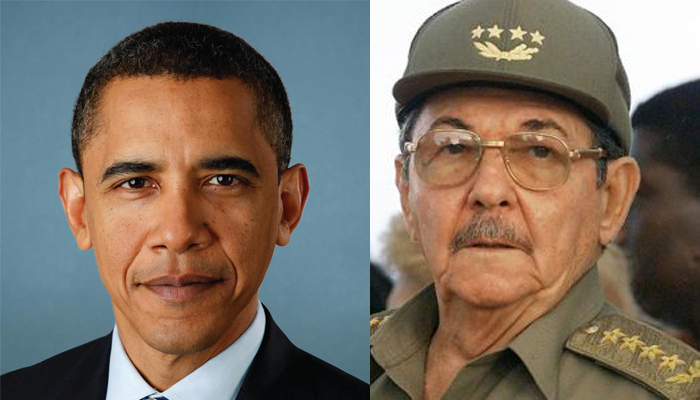President Obama and his aides raised a number of arguments justifying their sudden decision to normalize relations between U.S and Cuba.
They have claimed the status quo and the embargo have not helped topple the Cuban dictatorship. I concede this is true. Secondly, although Cuba made no commitment to decompress or alter in any way its repressive regime, President Obama believes that “more contact will do more to empower the Cuban people”.
The assumption is in Obama’s own words that “through a policy of engagement, we can more effectively stand up for our values, and help the Cuban people help themselves as they move into the 21st century.” The President apparently believes that by expanding commercial sales and exports of goods and services to Cuba and providing more business training and communication between the two countries, the regime will liberalize and adapt our values of free market, democracy and human rights.
This argument is doubtful because except for the U.S, Cuba was open to every other country in the world. China is instructive as an example. China has adopted a policy of economic openness, but this openness has not mitigated the oppressive character of its regime. Whereas there is always the possibility of liberalization — it is by no means guaranteed.
The Cuban regime is as stubborn as the Chinese and the upcoming death of the old generation and founding fathers of the revolution does not guarantee change. It is enough to look at Iran and North Korea to see this. Third, the Obama Administration also justified its move by claiming that the status quo in U.S-Cuban relations constituted an impediment to our regional policy. On this point, Brazil, the leader of Latin American regional policy, welcomed the decision.
Furthermore, according to Brazil’s chief foreign policy advisor Marco Aurelio Garcia, Brazil had assisted to advance the normalization. Garcia is the chief architect of Brazil’s foreign policy, which aims at developing an independent foreign policy, mostly pro-third world, firmly protective of the principle of national sovereignty and against the interference even on human rights issues. Likewise, Brazil is protective of the Venezuelan socialist dictatorship. Finally, Brazil is also harshly opposed to the expansion of American influence in the region where the South American giant claims leadership and hegemony.
I see the normalization more like a victory for this regional block and Brazil’s foreign policy because the U.S runs the risk of being effectively neutralized from taking unilateral action when it comes to issues of national security and human rights. The reality is that Cuba did not pledge to improve its ongoing negative record on human rights, which include unfair imprisonment and assassination of political opponents. While Obama’s signing the Venezuelan sanctions bill one day after the Cuba deal was announced is an encouraging step, it is not clear if Obama will go beyond. The region is likely to rally behind Venezuela as they did with Cuba and the U.S is likely to be forced to go along. Finally, the Obama Administration pledged to review Cuba’s status place on the list of countries that sponsor terrorism. Cuba continues to send military advisers to Venezuela where they assist in developing Venezuela’s repressive apparatus and totalitarian state. Venezuela itself harbors members of Hezbollah, Iranian Revolutionary Guards, the Revolutionary Armed Forces of Colombia (FARC) and the Basque guerilla group ETA.
According to a thorough report by Dr. Jaime Suchliki, head of Cuban-American Studies at the University of Miami , Cuba directly and through Venezuela continues to provide intelligence to Hamas and Hezbollah. Likewise, Cuba works with Venezuela in promoting Hezbollah and Iranian objectives in South America and against the U.S. Furthermore, Iran-Cuban cooperation on intelligence matters and sabotage has dramatically increased.
Cuba was reported to have facilitated the smuggling of narcotics and terrorists to the U.S. through Mexico and arms and explosives under Iranian diplomatic cover. Likewise, Cuban military officers work together with Venezuelan military, drug cartels and the FARC. It has also been reported that Cuba trains Venezuelan guerillas and Para-military that terrorize the Venezuelan population.
In mid 2013 Cuba tried to smuggle large amounts of sophisticated weapons to North Korea. The Economist reported that under Raul Castro, military and commercial co-operation between the two countries appears to have increased. These are important issues that affect our security and also the well being of the region. I doubt that any of these issues was addressed. If these issues are not addressed the normalization could turn only into another bombastic show of shocking news without tangible or positive results.
http://www.newsmax.com/LuisFleischman/China-Cuba-Latin-America-United-States/2014/12/23/id/614642/


Artículos Relacionados: